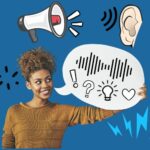On this page we look at
- What is racism
- What to do if you are on the receiving end
- Advice to other young people
- What to do next?
- Recommendations from Ipswich Youth Council
What is racism?
Racism is where someone thinks you are inferior because of your colour, ethnicity, nationality or race. This can mean people treat you differently or unfairly, this is racial discrimination.
Prejudice is a preconceived opinion that is not based on reason or actual experience. For example prejudice against or hostility toward people of another race or colour or culture.
Racial bullying is a type of racism, it is wrong and you can get help to make it stop.
It is illegal to treat people differently because of their race or culture.
Racism and racial bullying | Childline
If you are aware of any racist behaviour, or are a victim or witness of racism, you should report it to someone.
What is racial bullying?
Racial bullying is bullying which focuses on your race, ethnicity or culture. This could include being called racist names, being left out, treated differently or excluded, racist jokes because of your colour, nationality, race or culture, being made to feel like you need to change how you look
What is racial harassment?
Racial harassment can take place anywhere and includes jokes, name-calling, threats and physical violence and it should not be tolerated. It may be directed towards your ethnic or cultural background, your beliefs, food you eat or don’t eat, your clothing, your hair, or your family.
What is a racist incident?
A racist incident is defined as – any incident which may or may not constitute a criminal offence but which is perceived by the victim or anyone else as being motivated by prejudice or hate because of race.
What is Hate Crime and how can I report it?
Hate crime, including racist incidents, should be taken seriously no matter how insignificant you may feel it is at the time. To report an incident of hate crime or for more info, advice and support, visit the Suffolk Police website.
Read more about Hate Crime (and how to report it) and Bullying and Cyberbullying on our pages.
Watch the video below, two generations of men talk about experiences of racism.
“I’m on the receiving end of racism or prejudice”
Racism is wrong even if the person being racist doesn’t know it. It can make you feel upset even when it’s not aimed at you. It can make you feel sad, angry, and it can effect your confidence and self esteem.
It’s up to everyone to speak out when it happens.
We spoke to young women at the Strong Black Girls group in Ipswich about their experiences, they had this advice if you are dealing with racism:
“Call it out! Don’t brush it off – speak up and say it’s not nice, or they will do it to the next person.”
Communicate – Challenge the behaviour or comments if you can, and try to re-educate.
Tell them to stop – this could be you or someone else (an ally) who tells them that what they are doing isn’t appropriate.
Walk away – sometimes the safest way to respond is by walking away, then speaking to someone.
Ask for help – Report it. Speak to a teacher, a trusted adult or your friend. Get emotional support.
Get parents involved – It’s good to share your feelings with your parents or other trusted adults. They may have been through similar things, they can also help you get the support you need and make sure school is taking it seriously.
My school supported me “I went straight to the school and the school dealt with it for me. They were bullying me – calling me names, pushing me so I told my teacher, and the bullies were suspended. The teacher started a club to educate the bullies on racism and through that the bullies became my friends.” (Strong Black Girls group member)
Advice to other young people
It good to be curious about other cultures and different people. We are all different, that’s what makes us so special. So if you want to know something, ask politely.
- “The consequences of being racist online is that this will follow you as you get older – so don’t do it.”
- “Don’t assume where I am from based on my name or how I look – I was born here, I’m British”
- “Don’t touch my hair – if you want to know about my hair, politely ask me a question and ask my permission before touching me”.
- “Sometimes people are scared to ask questions because they might say something wrong but if you ask politely and respectfully with the intention of finding out more, that’s better than being rude”.
- “Be kind. If you have nothing nice to say, keep it to your self”.
If you would like to know more and get clued up do some reading: The black British history you may not know about – BBC News
Watch the video below to find out about microaggressions.
What to do next?
Being the target of racism can be really difficult, it can feel unfair, upsetting and it can harm your emotional wellbeing and self-esteem.
Speak to someone you trust or take a look at our emotional wellbeing helplines to find support.
Remember it's not your fault and it is important to get support for your emotional wellbeing if you need it - speak to someone.
You may find these links useful:
- Racism and mental health | How To Deal With Racism | YoungMinds
- A self-care guide for those impacted by racism – The Mix
- Ambassador voices: Learning to love my dark skin – The Mix
Groups for support:
Phoebe Centre – Offering support to black women and girls (PHOEBE project, Ipswich).
Ipswich and Suffolk Council for Racial Equality (ISCRE) – Delivers race equality services that bring significant benefits to Suffolk communities on issues around employment, housing, education, social welfare and criminal justice.
Recommendations from Ipswich Youth Council
For young people:
- Educate yourself.
- When you hear, friends and family being racist to others, or just being ignorant, speak out, tell them that it is unacceptable.
- Have diversity of thought, try to meet different people, they can offer you different experiences and views which could help you even improve yourself – be curious.
- Open the discussion with someone about BLM! Talking is the best starting point for change.
For schools:
- Have a clear recording and reporting system for incidents involving racism and discrimination and clear ways in how they will/ did address it, make this available to students and parents. This in return should make it clear to students and parents how their respective schools tackle forms of racism which would lead to them feeling safer and more comfortable at school.
- Teach more about diverse cultures, such as black history and culture – not just slavery. This is as we believe if young people are taught about other cultures they’re more likely to understand each other which in return could lead to a decrease in stereotyping, microaggressions and other forms of racism.
Read more in the Ipswich Youth Council presents: Black Lives Matter – A Youth Discussion – official report below
Page updated on September 19th, 2024 at 12:32pm





